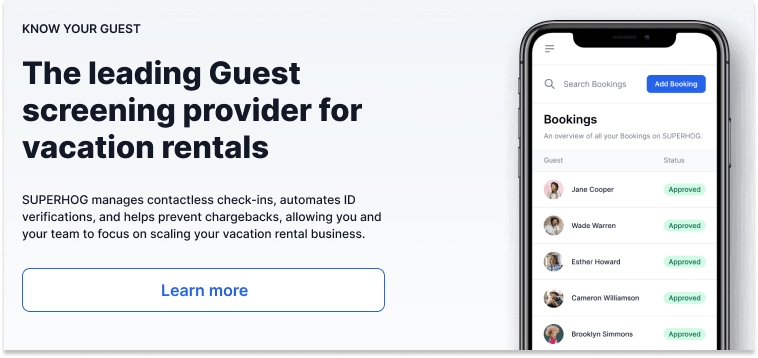A good guest experience is what will make or break your vacation rental business.
For property managers, having appropriate security measures in place to protect their hosts and their properties from damage and troublesome guests is crucial when it comes to the success of a vacation rental business.
There is, however, the possibility that you might damage the guest experience by implementing too many security measures that are strict, invasive, slow or not implemented properly.
A bad guest booking experience will reduce the number of bookings and in turn reduce revenue.
It’s a fine line when it comes to balancing security and guest experience.
In order to be successful, property managers need to strike the right balance between having comprehensive security measures in place that protect them but also don’t have a negative impact on the guest’s experience.
Too many security measures will scare away potential guests, but not having the correct processes will leave the business and vacation rentals vulnerable to damage.
The good news is that with the right strategy and tools, you can adapt or develop a booking journey that ensures a great experience but also keeps the business and its assets safe.
Here’s how you can do it:
- Prioritize the guest and their safety
- Inform guests about security measures right from the start
- Be transparent about the collection of personal data
- Make your check-in/out process as smooth as possible
Put the guest first and prioritize their safety
It’s not rocket science. The guest is your customer, and if they have a bad experience, they’ll cancel their booking and worse than that, not consider booking with you ever again.
Word travels fast, and one bad experience can put a mark against your business to potential guests.
Every guest is different and comes with a different risk profile, so don’t treat them all the same.
When it comes to the different risk levels, as a business, you need to decide what level of risk you are comfortable with and build your booking journey around that decision.
The type of questions to consider are: what kind of behaviour/acts will you not tolerate? What do you expect of guests? What do you consider mandatory to all guests?
Once you have sorted your risk tolerance levels, tailor your security measures to the different levels of risk.

The best way to do this is to introduce a dynamic screening process to your guest journey. A dynamic screening process means that different guests do different types of verifications in relation to their risk profile.
As an example, if a single guest was looking to book a four-bedroom house for a one-night stay, this is an instant red flag and could be for a party.
If you were unsure and wanted to go ahead with the booking so as not to miss out on the revenue, you could ask that guest to verify their ID, validate their credit card and ask them to pay a security deposit.
But if a family was booking the same house for a week or longer, you might enforce fewer steps in your guest screening process, because the overall risk is lower.
The key takeaway from this is to think – does the reward outweigh the risk?
Inform guests about security measures right from the start
The key to providing a good guest experience when it comes to processes like screening and other security measures is to set expectations early and bring them to the guest’s attention as soon as possible.
If possible, outline in your listing details and communications your guest screening processes, any monitoring systems (like external cameras or noise monitoring devices) present at the property, and the house rules that you require all guests to follow.
To protect yourself further, reiterate this in any rental agreement that you have the guest sign, showing that they legally acknowledge the information you have provided.
By clearly communicating your security measures, bad guests will be deterred and good guests won’t bat an eyelid when it comes to completing them if they have been made aware of how you operate and what you expect from them.

Transparency about personal data is key
Even though we live in an increasingly digital world, people are still very wary about giving their sensitive information online.
Unfortunately, the vacation rental industry is also plagued by crimes such as fraud and identity theft, so how you handle a guest’s private information is crucial.
In order to show that your processes are legitimate and secure, build trust with guests through transparency.
Again include in your listing wording or in any message you send to guests, what personal information you collect during the screening process and what happens to that information, making it abundantly clear that your process is compliant with all privacy and data protection laws.

Make your check-in/out process as smooth as possible
After a seamless booking process, providing a smooth check-in makes a substantial difference when it comes to the guest experience.
A hassle-free check-in will get the booking off to a good start. With more and more guests wanting less interaction with their hosts, the online check-in process should be simple, smooth and delivered in a timely manner.
Here are two examples that can influence the guest experience at check-in and checkout:
- Check-in: if you use digital locks or lockboxes for access to the property, make sure that you communicate with your guests and get the codes to them with plenty of time before they arrive.
- Checkout: if you collect a deposit, return the amount as soon as possible after their check-out if your post-booking checks return no signs of damage.
How can Superhog help with security and guest experience?
Superhog independently verifies guests across all booking channels, seamlessly integrating with your pre/post-booking guest journey.
Each validated booking is then protected by Superhog’s industry-leading Host Guarantee that provides up to $5,000,000 of protection against guest property damage.
Want to know more about how Superhog can help your vacation rental business? Book a demo with one of our experts for a one-on-one live demo below.

